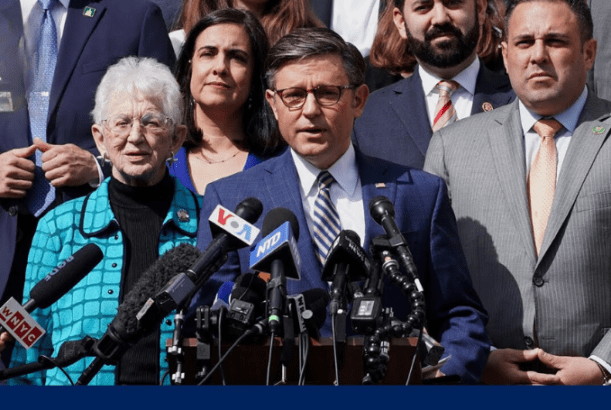Although the pro-Israel camp and their allies continue to dominate and influence Congress and the executive branch, they have slowly begun to lose control of the narrative.
By Dr. M. Reza Behnam, reposted from the Palestine Chronicle, April 25,2024
Although the pro-Israel camp and their allies continue to dominate and influence Congress and the executive branch, they have slowly begun to lose control of the narrative.
The Middle East will not be the same in the wake of October 7, 2023. More was breached on that day than the prison wall that Palestinian fighters burst through. The fantasy Israel has staged-managed, and the United States has parroted, for over seven decades has finally seen the light of day. The global community can no longer be gaslit.
Merriam-Webster defines gaslighting as “the act of grossly misleading someone especially for one’s own advantage.” The term has resonance for what Israel and the United States have successfully done over a number of generations—creating a benign identity for Israel that has never corresponded with its ruthless settler-colonial reality.
The awful truth is that it has taken the death of over 34,000 Palestinians for many in the United States and the world to say “Free Palestine.” The mainstreamed Israeli “good guy” narrative that has colonized the US body politic for so long is being whittled away by the horrific images of daily genocide and ecocide from Gaza.
A country does not become cruel overnight. It takes intent, years of practice and strategies to effectively hide the cruelty. Since it declared itself a state in 1948, the occupied territories known as Israel has relied on an elaborate state-run public relations industry to convince Western audiences, particularly Americans, of its bravery and noble intentions.
For over six months, Israel’s brutality has been brought into the living rooms of America. Until then, Israel had made certain that its foundational myths and beacon of democracy tale dominated American politics and government, religion, journalism, academia, cinema and television.
Those who have been successfully gaslit, whether consciously or unconsciously, and who wish to maintain existing power structures continue to deny the genocide being live-streamed before their eyes, and have galvanized to crush those opposed to Israel’s war on Palestinians.
American Politics and Government
For decades, Israel has manipulated US politicians emotionally and financially to advance its expansionist ambitions. Israeli lobby groups, like the powerful American Israel Public Affairs Committee (AIPAC), have poured billions into the coffers of receptive politicians.
Pro-Israel spending has fueled Congress’s overwhelming support for the apartheid regime. Rarely, if ever, do they question why aid is being given to the fourteenth richest (per capita) country in the world. From 1990 to 2024, for example, the “I am a Zionist,” president, Joe Biden has received $5,736,701 from pro-Israel lobbies.
In 2024, AIPAC plans to spend $100 million in an effort to unseat progressive members of Congress (eight in number) who have been critical of Israeli policy and who have called for a ceasefire in Gaza.
In January 2024, The Guardian newspaper published its analysis of campaign data. It found that congressional members supportive of the war received the most money from Israel lobby groups.It also revealed that 82 percent of its members support Israel; 9 percent are supportive of Palestine; and 8 percent were equally supportive of both.
Religion
Israel’s leaders have also capitalized on the powerful force of religion to whitewash their settler-colonial project. They have exploited the ideology of biblical chosenness and divinely sanctioned land ownership to legitimize land theft, to dispossess the Palestinians and to sell its genocidal war on Gaza.
An Israeli Democracy Index, 2013 survey revealed that two-thirds (64.3 percent) of Israeli Jews consider Jews to be the “chosen people.” The prominence of this belief has resulted in attitudes and government policies of exclusion, entitlement and ethnic chauvinism.
Prime Minister Benjamin Netanyahu’s war rhetoric has been suffused with violent biblical references. He has cynically ascribed the term Amalek—the staunch enemy of biblical Israelites—to Palestinians. The far-right in Israel has, for a long while, used such references to justify killing Palestinians.
The Evangelical right has stood solidly with Israel; even more so during its war on Gaza. The Israel, Zionist lobby and Christian Zionist (religious right) alliance have had enormous influence over US Middle East policy. For every one Jewish Zionist, there are 30 Christian Zionists. Netanyahu has courted Evangelicals cognizant of the power they exert within Congress.
Christian Zionism demands of its followers absolute support for Israel, believing that the Rapture and Second Coming of Christ require the gathering of all Jews in Israel, and that supporting Israel will bring God’s blessing on them and on their nation.
[Editor’s note: Read The Scofield Bible: The Book That Made Zionists of America’s Evangelical Christians, also see this and this.]Many American evangelicals have been cheering Israel’s war on Gaza, believing it to be a prelude to the end times prophecy.
Christian Zionists have found powerful allies in the White House and in the US Congress. In the Trump White House, for example, evangelicals held seats of power with the likes of former Vice President Mike Pence and Secretary of State Mike Pompeo.
There are at least 100 evangelicals currently serving in Congress, including the Republican Speaker of the House, Mike Johnson. It has become almost mandatory for members to attend AIPAC and Christian evangelical events, as well as excursions to Israel to assure the apartheid leaders of their continued loyalty.
Journalism
American public opinion has been molded to look with favor on Israel. Mainstream journalism has become largely a stenography service for US-Israeli interests. Most of the pundits and so-called experts on television, for example, come from think tanks funded by pro-Israel groups: The Washington Institute for Near East Policy, American Enterprise Institute, Foreign Policy Research Institute, The Heritage Foundation and Council on Foreign Relations.
Intellectually honest analysis or criticism of Israel is met with orchestrated pressure from Jewish lobby groups or with the dreaded label of antisemitism. Such tactics have been used to create a climate of intimidation, which has often led to self-censorship.
It is useful to look at a few examples to understand how alternative narratives regarding Palestine have been discouraged for decades.
Ariel Sharon, former Israeli defense minister, filed a libel suit after Time magazine ran a cover story in 1983 accusing him of encouraging the massacre of Palestinians at the Sabra and Shatila refugee camps in Lebanon in September 1982. In 1984, Americans for a Safe Israel filed a petition requesting that NBC’s license be revoked over its reporting of Israel’s 1982 invasion of Lebanon. CBS faced similar criticism for airing veteran reporter, Bob Simon’s “60-Minutes” report about Christians living under Israeli occupation. A full-page ad in The Wall Street Journal excoriating Simon appeared soon after.
CNN’s founder, Ted Turner, caused an uproar when he told the Guardian in 2002 that Israel was engaging in terrorism against the Palestinians, resulting in threats to the networks revenue. Walter Isaacson, then CNN Chair, appeared on Israeli television to denounce Turner and the network’s chief news executive, Eason Jordan, flew to Israel to appease the regime.
Magazines such as The New Republic, The Atlantic and Commentary have also been influential in creating an Israel-centric worldview. Pro-Israel syndicated columnists Thomas Friedman, Bret Stephens, George Will and David Brooks—whose son has served in the Israeli army—dominate the op-ed pages of major newspapers.
Since the October assault, a number of journalists have faced censorship, retaliation or dismissal for presenting the Palestinian narrative or for criticizing Israeli violence. The firing in October of Michael Eisen, editor of eLife, a prominent academic science journal, after he retweeted an article from the satirical Onion titled, “Dying Gaza’s Crticized for Not Using Last Words to Condemn Hamas,” reflects how censorship has reached into all media platforms.
[See A statistic 1,000 times too small doesn’t warrant a correction in the NY Times]All foreign news organizations operating in Israel are subject to Israeli military censors. To suppress the horrors coming from Gaza, Israel has refused to permit foreign journalists independent access to that beleaguered Strip. Only Palestinian reporters already there have been able to report; for that, they and their families have been targeted. According to the Committee to Protect Journalists, as of April 25, at least 97 journalists and media staff have been killed and 16 injured since the war began.
Academia
For over two hundred days, Israel’s supporters have been straining to preserve their stranglehold over American universities. They are aware that people are losing their fear of Israel’s watchdogs like Canary Mission, Stand With Us and Hillel; groups that have made it their mission to suppress critical discussion around Israel on college campuses.
Academic freedom has been denied professors who have bravely challenged accepted Israeli renderings. Professors Rabab Abdulhadi, California State University, San Francisco, Steven Salaita, University of Illinois Urbana-Champaign, Norman Finkelstein, De Paul are among the academics who have been intimidated or terminated.
Pro-Israel forces have stepped up their pressure on administrators, as demonstrations on university campuses have grown. Wealthy donors have used threats to withhold, or have withheld, donations if speech critical of Israel is allowed. Administrators have responded, dismissing professors, setting limits on free speech, conflating protests with antisemitism and using police to break up demonstrations. More than 100 Columbia University students were arrested on April 18 after the university called in the New York Police Department to clear a protest encampment.
Students reported being sprayed with a putrid smelling chemical agent at a Columbia demonstration. They later learned that they were sprayed with a chemical called “skunk;” an agent developed by Israel and that has been used for years by the Israeli military against Palestinians in occupied Palestine.
Earlier in April, the University of Southern California, citing unspecified security concerns, canceled plans for a graduation speech by this year’s valedictorian, Asna Tabassum, a Muslim student. Disappointed, Tabassum said the school had succumbed “to a campaign of hate meant to silence my voice.”
Pro-Israel groups have also looked to Congress to neutralize the growing pro-Palestinian protests. House Republicans have held hearings to “investigate” antisemitism at America’s prestigious universities. Thus far, the presidents of Harvard and the University of Pennsylvania have resigned following their appearances. And on April 24, Speaker Johnson called for the president of Columbia University, Nemat Minouche Shafik, to step down.
Safety and antisemitism have been used as weapons to silence campus criticism of Israel. In November, after Jewish students complained of feeling unsafe upon hearing remarks critical of Israel, Columbia banned its chapters of Students for Justice in Palestine and Jewish Voice for Peace.
The intensity of Israeli indoctrination is reflected in the reaction of some Jewish students who believe that protests targeting Israel constitute personal attacks on them as Jews.
Many young American Jews have been raised with the idealized image of Israel as a righteous state, necessary for Jewish safety. A large number have made the free ten-day trip to Israel sponsored by Birthright Israel, an organization supported by the Israeli regime and wealthy philanthropists like the late Sheldon Adelson. Birthright, founded in 1999, has played a large role in shaping loyalty to Israel. Predictably, the reality of the occupation has never been a part of the group’s tour.
Cinema and Television
Israel loyalists have masterfully utilized the media to shape public perceptions and attitudes. Movie and television screens have been filled with an abundance of positive, sympathetic images of Israel that have shaped public perceptions.
Undoubtedly, the 1960 film, Exodus, firmly implanted the heroic image of Israel in the minds of many Americans. The heroism of the Palestinian people fighting to preserve their homeland from Israeli domination has yet to hit the big screen.
Beginning with the 1921 silent film classic, The Sheik, filmmakers have cast Middle Easterners, Arabs and Muslims as exotic, uncultured, idiotic, lecherous and violent, indistinguishable from one another.
Although racist depictions of Arabs is not new to the film and television industry, media providers Showtime, Netflix and HBO have amped up the propaganda with series such as Homeland, Fauda (meaning chaos in Arabic), The Messiah, The Spy, and Our Boys. These dramas, from which many Americans draw their information, portray Israel’s secret police as virtuous defenders of law, hunting down threatening Arab “terrorists.”
Caricatures and negative cinematic imagery have contributed to the destructive dehumanization of Arabs, as witnessed today in Gaza. The powerful political narrative created around Arabs has allowed Israel’s genocide of Palestinians to become an image on a screen or just another news event.
For more than eight decades—from photoplay sheik movies of the 1920s to the elaborately produced films of the present—Hollywood filmmakers have perpetuated Middle Eastern stereotypes that have cultivated prejudice and division between peoples and nations. These stereotypes have created a pattern of socialization that has made the Middle Eastern world distant and vulnerable to attack.
Conclusion
Although the pro-Israel camp and their allies continue to dominate and influence Congress and the executive branch, they have slowly begun to lose control of the narrative.
President Joe Biden, however, remains dedicated to the Israeli fantasy. He has embraced and subsidized a racist supremacist Israeli regime; a 57-year apartheid occupation; squatter colonialism and genocide in Gaza.
While professing commitment to achieving a Palestinian state, the United States alone vetoed an April 18 Security Council resolution that would have allowed full United Nations membership for the state of Palestine. And while Israel continues its intense bombing in Gaza, Biden signed legislation on April 24, allocating another $26.4 billion for Tel Aviv to continue its atrocities.
Israeli gaslighting has reached into and exerted influence in almost every segment of American society. Consequently, Israel has grown into an entity unbound by borders, exempt from international law and able to commit genocide with impunity.
The horrific images coming from Gaza are, however, making it increasingly difficult for Israel and its US allies to silence dissent and to continue gaslighting the American public.
Dr. M. Reza Behnam is a political scientist specializing in the history, politics and governments of the Middle East.
RELATED:
- US Senator Incites Violence Against Gaza Protesters
- ‘Different rules’: special policies keep US supplying weapons to Israel despite alleged abuses
- Greenwald: The Unholy Alliance of Neocons & Democrats
- Ambitious Mike Pence meets with Miriam Adelson & anti-Christian Israelis connected to terror group
- Indisputable facts about Israel and the International Criminal Court
- The Scofield Bible: The Book That Made Zionists of America’s Evangelical Christians
- Israel’s years-long recruitment of African American Christians: A case study
Against Our Better Judgment: The Hidden History of How the U.S. Was Used to Create Israel Paperback
Analysis of Media Coverage of Israel/Palestine





